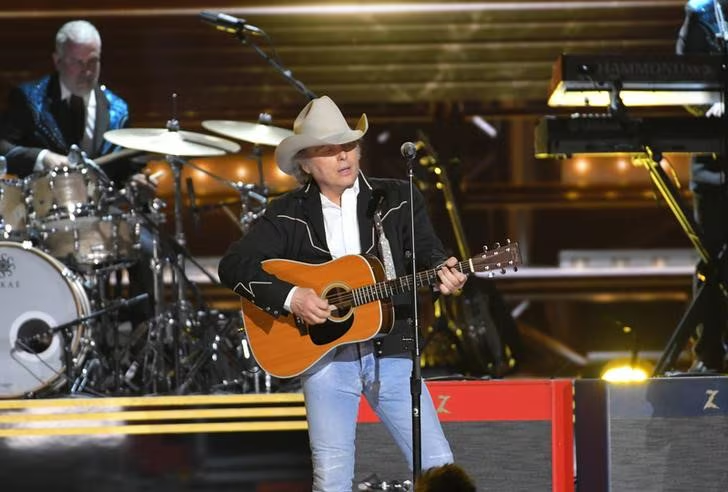
A working-man’s valentine—gratitude set to a Telecaster strut, where overdue bills and long weeks shrink beside the simple fact that somebody’s waiting at home.
Essentials up top. Song: “I Got You.” Artist: Dwight Yoakam. Album: Buenas Noches from a Lonely Room (Reprise; LP released August 2, 1988). Single: issued February 1989 as the album’s third 45, written by Yoakam and produced by Pete Anderson; B-side: “South of Cincinnati.” Chart peaks: No. 5 on Billboard Hot Country Songs (U.S.) and No. 5 in Canada. Running time: ~3:28. On the original LP, it opens Side One, a bright doorway into a record otherwise full of jealousy, loss, and reckoning.
Set against the late-’80s country dial, “I Got You” felt like fresh air punched through a screen door. Buenas Noches from a Lonely Room had already delivered two landmark singles—“Streets of Bakersfield” (with Buck Owens) and the aching “I Sang Dixie,” both No. 1s—so this third release arrived with momentum. It answered the album’s darker themes with a wink and a grin: the narrator’s world may be fraying at the edges, but he’s got love enough to keep the seams together. On paper that sounds simple; on tape it’s the kind of plain truth country music was built to carry.
Musically, the record is Bakersfield discipline dressed for 1989 radio. Pete Anderson keeps the mix bone-clean: snare and kick in a no-nonsense pocket, bass walking with purpose, rhythm guitar chopping time, and a barbed Telecaster answering Yoakam’s phrases in short, satisfying jabs. Nothing grandstands; everything serves the line. You can practically trace the air around the instruments—that dry, close sound the team was getting in Los Angeles studios at the time—and feel why the chorus sticks after a single spin. The production credit and album context bear it out: Anderson at the board, Yoakam out front, Bakersfield virtues intact.
Lyrically, the song turns working-class pressure into pop clarity. Bills pile up, jobs pinch, the phone company writes unhelpful letters—and then the refrain shrugs the weight off with four syllables that feel like a hand at your back: I got you. Critics have rightly pointed out that, in an album crowded with dire turns, this track carries the set’s wry humor—the comic relief you earn only after you’ve told the hard parts straight. That’s why older ears still lean toward it: the joke isn’t a mask; it’s a survival skill. And the sequencing matters—leading Side One with this small victory throws the rest of the album’s storm into sharper relief.
The chart story confirms how cleanly it connected. As a third single—traditionally a tougher slot—it still climbed to No. 5 in both the U.S. and Canada, a sturdy Top-5 that kept Yoakam in heavy rotation while the album toured the country. Spin the original 45 and you’ll see Reprise 7-27567 on the label, with “South of Cincinnati” tucked on the flip—another reminder that even Yoakam’s B-sides in this era wore strong bones.
What keeps “I Got You” warm decades on is its everyday mercy. Yoakam doesn’t posture; he hosts the song, singing half a breath behind the beat so the promise lands like conversation, not speechmaking. The band leaves air around him; the guitars answer like old friends who don’t need to be asked twice. It’s the sound of grown people keeping each other upright: a chorus you can two-step to in a VFW hall, a verse you can hum while you wait for the coffee to finish. If you lived with country radio in 1989, you remember that feeling—how certain singles didn’t demand attention so much as restore it. This was one.
Placed in the arc of Buenas Noches from a Lonely Room, the track also works like a thesis in reverse. That record is famous for its bleak, even lethal storytelling; here, at the very front, comes the antidote: gratitude. You can hear the album’s narrative tighten because of that choice, and you can hear a career sharpening too—Yoakam proving he could ride the middle tempo, keep the twang sharp, and let kindness carry the hook without softening the edges.
Key facts, verified: Song: “I Got You.” Artist: Dwight Yoakam. Album: Buenas Noches from a Lonely Room (Reprise; Aug 2, 1988). Single: Feb 1989; writer Yoakam; producer Pete Anderson; length ~3:28; B-side “South of Cincinnati” (Reprise 7-27567). Chart peaks: US Country No. 5, Canada Country No. 5. Album placement: opens Side One. When you put all that together, the song reads like what it’s always been—a crisp, humane Top-5 that turns the everyday into something worth singing about, then and now.